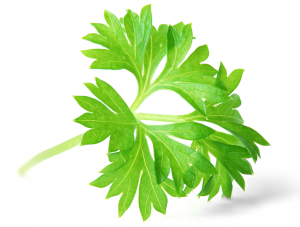Parsley – a chemotherapeutic herb
By : alegria | 0 Comments | On : November 6, 2012 | Category : Alegria Fresh Newsletter
In your bouquet this week, you’ll find an herb that looks familiar: parsley. Garnishing many a plate, this popular herb is often just ignored. By disregarding parsley, you are giving up a chance for numerous health benefits from this tasty herb.
Botanically known as Petroselinum crispum, parsley’s common name is derived from the Greek word for rock celery, betraying both its roots in Greek culture and its relation to celery. Native to the Mediterranean region, records indicate it was a common herb in Greek culture dating as far back as 2000 BC. It has a long history of a variety of uses, including its current use as a garnish. The Greeks thought of parsley as sacred, thereby using it to adorn tombs and victors of athletic events. The Romans were the first to use it as a medicinal herb around 79 AD.
The Romans were smart to use parsley as medicine, because it has a wide range of qualities that lead to numerous health benefits. The mixture of important vitamins, antioxidants, and flavanoids in parsley assists the body’s fight against cancerous invaders, thereby preventing many types of cancer, including pancreatic, leukemia, cervical and ovarian cancers. The flavanoids in parsley also have strong anti-tumor properties, which can fight and prevent multiple stages of cancer. Parsley also acts as a detoxifier, ridding the body of cancer before it can take hold and multiply.
In addition to fighting cancer, parsley is also anti-inflammatory owing to the combining forces of luteolin, one of its flavanoids, and vitamin C. This makes parsley a great combatant against inflammatory diseases like osteoarthritis and rheumatoid arthritis. The combination of flavanoids and strong antioxidents also supports the body’s oxygen disposal, helping prevent oxygen-based damage to cells. Parsley also has other disease fighting benefits thanks to the strong antioxidant properties of both vitamin A and C, which work together to strengthen the body’s immunity against not only the aforementioned cancer and inflammatory diseases, but also diabetes and even the common cold.
 Parsley also has high amounts of other important vitamins. The high levels of B vitamins, especially folic acid, found in this herb keep the heart healthy. Folic acid fights against harmful molecules that can damage blood vessels and increase the risk of heart attack or stroke. Vitamin K, also found in high levels in parsley, is an essential vitamin for the bones, strengthening the bones and aiding in calcium absorption. Along with being packed with so many valuable vitamins, parsley also carries large amounts of essential minerals, including potassium, calcium, manganese, iron and magnesium. Potassium is important for muscle health, including the all-important muscle of the heart, while iron is important for the regulation of blood cells, and calcium keeps bones strong.
Parsley also has high amounts of other important vitamins. The high levels of B vitamins, especially folic acid, found in this herb keep the heart healthy. Folic acid fights against harmful molecules that can damage blood vessels and increase the risk of heart attack or stroke. Vitamin K, also found in high levels in parsley, is an essential vitamin for the bones, strengthening the bones and aiding in calcium absorption. Along with being packed with so many valuable vitamins, parsley also carries large amounts of essential minerals, including potassium, calcium, manganese, iron and magnesium. Potassium is important for muscle health, including the all-important muscle of the heart, while iron is important for the regulation of blood cells, and calcium keeps bones strong.
There is a good reason parsley is found as a garnish on your plate. Containing important digestion enzymes, it stimulates and improves digestion. Therefore, eating that sprig of parsley will relieve any upset stomach, gas, or indigestion that come as a result of over-indulgence. It can even improve bad breath, masking even the strongest causes like onions and garlic. Next time you see some parsley on your plate, go ahead and eat it for your health and breath alike!
You don’t have to wait to enjoy parsley, as you’ll find magnificent parsley in your bouquet from Alegria fresh. You can serve it, knowing you are getting the full benefits of parsley because it has been picked and delivered to you within hours.
Don’t let parsley just be a garnish. Enjoy this nutrient-packed herb with this recipe.



